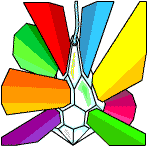The Phoints - A Colonial Tragedy (UG)
Created | Updated Apr 25, 2006


I have been asked1 to write a few words about the Phoints, a sad and now homeless race of sentients most commonly identified by their large, pointed ears and blue skin.
It saddens me to have to do this. It is never enjoyable to contemplate the planetary failures - all too many of them - whose blackened corpses litter our sector of the galaxy. There is the smoking ruin of Magma Major, whose clouds of volcanic gases, still being released after that world's now-extinct population's fatal attempt to tap into the molten core for cheap energy, can be seen as far away as the neighbouring planets. And, of course, the woefully misnamed Urania Utopia, whose overplanned society spawned four successive sector wars before being reduced to picturesque rubble by their offended neighbours, who very considerately relocated the population first. Forbidden to congregate in large groups, the former citizens of Utopia Urania are usually to be found operating postal services on small planets, where their organizational skills are highly prized.
The cause of most of these failures can be traced to the usual suspects - greed, arrogance and intellectual pride - among the dominant sentient species. All of these factors contributed to the fall of the Phoint society on the planet they called New Eden.
The inhabitants of New Eden, having mostly come from the State of California on 21st-Century Earth during the time of the Great Migration (also known as the Great Eco-Panic), were well aware of the mistakes of their ancestors, who had plundered their own planet's non-renewable resources for temporary gain. They were determined not to repeat those mistakes - and so, of course, they did. To the very letter.
The reason for this, though simple, usually manages to elude the grasp of most sentient species. The problem is, of course, that the New Edeners wanted exactly the same things as their ancestors, who had headed out to a warm, sunny climate in search of gold, fresh oranges, a film career, or a really good suntan, and turned their home territory into a bastion of spoiled rich people fond of the Next New Thing who built fabulously overpriced houses on cliffs and then complained about mudslides.
New Edeners were in denial about this - remarkable, really, as the phrase 'in denial' had originated with them.
According to the New Edeners, they were an ecologically responsible people now. They had solar panels, they had chemical toilets, they had New Sierra Club badges. They hugged trees passionately - the trees, just as passionately, did not hug back, but gave them rashes.
What they did not have was the sense to realise that there's no such thing as a free lunch in the universe. They still wanted something for nothing. And they didn't realise what kind of planet they were on.
The planet which the Phoints called New Eden is an AIE - Autonomous Interlocking Ecosystem, called by its real inhabitants by the name Suluhu. The indigenous inhabitants of Suluhu were not even recognisable to the settlers from Earth, as they were so much part of the planet itself that they appeared to be merely interesting rocks.
The Anorthosians of Suluhu possess a crystalline intelligence which is capable of soundless communication over vast distances, so that they are in constant communication with each other all over the planet. They are so imbedded in the geologic life of their world that disturbances in its ecological balance affect them deeply. They were not best pleased at the arrival of a shipload of chattering monkeys with a history of mineral dependency and a habit of leaving their trash all over the place.
But the Anorthosians are patient, and tolerant up to a point. They did not announce their presence, and they bided their time.
The New Eden colonists did all the usual sorts of things - claimed the planet in the name of peace, freedom and mutual respect for diversity, meaning the sorts of diversity they recognised, such as variance in musical taste, and set about installing themselves on the most desirable pieces of real estate, so that they could get to the Good Stuff about colonisation, such as building really great retail outlets.
The Anorthosians watched and waited.
The New Edeners built and built. They landscaped. They developed new recipes for salsa made from local plants. They wrote patriotic songs about their new homeland. They congratulated themselves on having found an M-class planet on which to settle with no previous inhabitants, thus avoiding all that colonial guilt-trip thingy.
Then they opened their computer factories.
New Silicon Valley, as it was called, was to become the mecca for galaxywide computer systems - and all because of the primary discovery of the New Eden planetary survey team.
This is the survey team, by the way, that had failed to notice any sign of sentience anywhere, despite the existence of remarkable geometric structures around the planet, which served no apparent function, and which were written off as geological oddities - but which were, in reality, sacred sites to the Anorthosians, who also used them as power conduits, as we shall see.
The discovery the survey team had made was the rare, perfect quality of the tiny crystals to be found emerging in profusion from the ground on certain plains and valleys of New Eden. These crystals were ideally suited for components of the new Maximulti-I computer, the fastest PC in the galaxy, with a capacity of 500 terabytes for easy storage of important data, such as the latest holographic download of the Galactovision Song Contest winners in concert.
Unfortunately, these tiny crystals were Anorthosians in their first, budding state of development. The New Edeners were baby-snatchers.
For a while, the Anorthosians watched helplessly as their offspring were harvested in industrial quantities and incorporated into the new computers. But then the hard-drive programming was installed, and they began to get messages from the computers, infant Anorthosians begging for help from their elders, and a plan was born.
It was when beta-testing began for the new computers that the gr*t hit the impurity filter, so to speak. Thousands of messages were sent, googolplexes of connections rerouted, and Things Began to Change.
At first, the alterations in the environment were subtle. The persistent cough developed by New Edeners was attributed to such Bad Habits as clove-cigarette smoking, and there was the usual Just Say No campaign. And when that failed to improve respiratory health, oxygen bars became a fad.
Other subtle changes took place in the vegetation and water supply, with the result that New Edeners developed a failure in the NADH diaphorase enzyme in their blood. This was merely an inconvenience, not being life-threatening, but turned their skin a deep blue. More alarming were the chemicals released into the air by night-blooming flowers, which caused disturbing nightmares and bizarre growth in cartilaginous tissues, resulting in long, sharp noses and pointed ears. The New Edeners, who worshipped physical beauty, were appalled. Worse yet was the fact, not discovered until later, that all their offspring would be born hermaphrodites, thus ruining their entertainment industry, which relied solely on intergender attraction and conflict as the basis for story and song.
But the Anorthosians were not finished. Before the beta-testing of the new computer could be completed, rerouting of the crystalline structure of Suluhu had proceeded so far that adjustments in the gravitational fields of the planet could be made on a moment-to-moment basis, resulting in serious accident and injury to the bipedal interlopers and their vehicles.
Meetings were held, theories promulgated. Feuds and minor wars broke out. Valiant efforts were made to counter the daily onslaught of new alterations in the environment, but to no avail.
Then the Maximulti-I went on the market.
All over the galaxy, users noticed an alarming effect, as their new computers liaised with previously existing systems to create new, unheard-of networks. Holovision stations were bombarded with broadcast signals decrying the anticrystalline behaviour of the colonial powers on New Eden. Toasters and coffee machines delivered stern lectures. Letters were written to homeopapes, signed by vacuum cleaners. People were upset.
At a meeting on Omicron 7, the Galactic Council empowered the Enviropolice to investigate the matter. Soon their computers had talked to the ones on New Eden, and the truth came out.
All Maximulti-I computers were returned to Suluhu, where their components were reintegrated into Anorthosian society, and rehabilitation begun. The New Edeners were forced to pay a fine so large that it wiped out their PDP (Planetary Domestic Product) for ten years. That, and the increasingly hostile environment, forced them to emigrate, and the animosity brought about among other species by their idiotic behaviour made them unwelcome immigrants.
Today, the Phoints, as they are now pejoratively called, live mostly on space stations, employed ironically as engineers for life-support systems. They got a lot of experience fighting what they now call the Anorthosian War.
So, if you meet a blueskinned, pointy-eared, unisex alien on your journeys, please refrain from telling him any computer jokes. It is considered unkind to speak of the rope in the house of the hanged.

